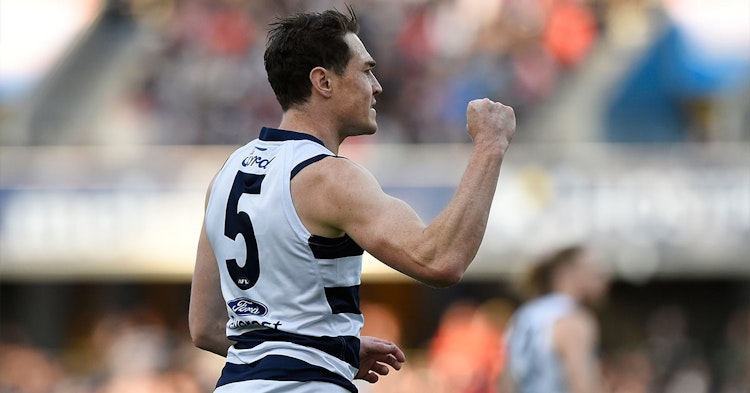Previewing Each Game from Week 1 of the 2022 AFL Finals
Last updated: Aug 30, 2022, 7:24AM | Published: Aug 30, 2022, 4:28AM
Finals footy. Ushering in September with meaningful men’s AFL matches is a tradition, and this week we are faced with four epic contests to get us going.
Let’s have a look at how each match in Week 1 of the AFL Finals could play out over the next few days.
MORE: Our 2022 Brownlow Medal predictions are live
Brisbane vs Richmond
A September institution, this will be the third clash between these two teams at the Gabba in the first week of finals.
With perfect conditions expected for the Thursday night game, we should expect this to be a high-scoring encounter between the two highest-scoring teams in the competition. The Lions have struggled defensively despite the form of Harris Andrews and Brandon Starcevich – since the bye, Brisbane has conceded 89.11 points per game, which includes four triple-figure totals.
The Tigers are expecting Dustin Martin to return to add to their ammunition, while the Lions will be without Cam Rayner and Noah Answerth from their Round 23 clash. Of course, the last time these teams met, Richmond overcame a 42-point deficit to get the win.
Brisbane’s key to victory will be an improvement in their ball use. Richmond are the best team in the AFL at scoring once they win the ball back, so it will be up to the Lions to ensure they aren’t coughing the ball up too high up the ground.
Forcing Brisbane turnovers in their forward half will give the Tigers ample opportunities to hit the scoreboard against a weak defence.
Brisbane vs Richmond is at the Gabba on Thursday, September 1 at 7:20pm.
Melbourne vs Sydney
The Demons and Swans play a relatively similar brand of football, certainly moreso than they’re given credit for. Where Melbourne try and play a strong brand of defensive footy, as the second-best intercepting team in the competition, the Swans’ focus is more at ground-level, applying strong tackling pressure around the contest and restricting the opposition’s ability to move the ball efficiently from stoppages.
Sydney concedes a score in 41.94% of the opposition’s inside 50 entries compared to Melbourne’s 39.51%, while the two teams concede the fewest marks inside 50, as well as the fewest goal assists as a playing group, alongside Fremantle.
The battle between the teams will be who is able to withstand pressure better and control the ball. Sydney relies on marking to retain the ball once they win the contested stuff on the inside, whereas Melbourne looks to win the intercept, move the ball forward as quickly as possible and lock it inside 50 with the pressure of Kysaiah Pickett, Charlie Spargo and Alex Neal-Bullen.
Sydney won the Round 12 clash against Melbourne relatively convincingly by winning the contested ball, tackling hard and playing direct. Both teams will struggle if the other plays direct footy as the defence will open up and the Demons’ offensive ball movement indicates that’s a more natural style for them.
Melbourne vs Sydney is at the MCG Friday, September 2 at 7:50pm AEST.
Geelong vs Collingwood
No team has won as many close games as the Magpies, with 11 of their 16 wins this season coming by less than two goals. Quite remarkably, they were behind at three quarter time in six of these games, relying on a last-quarter blitz to overcome deficits.
On the flipside, despite facing some scares, the Cats haven’t lost since Round 10 and only one of their last eight matches have been decided by less than 28 points, with the minor premiers clearly establishing themselves as the best team in the league.
Geelong’s recent 2-7 record in qualifying finals will be played up in the media, yet Collingwood’s astonishingly low percentage and preference to play counter-attacking football plays heavily into the Cats’ favour.
The Magpies ranked third for tackles and were the AFL’s best intercepting team, relying on their pressure through the midfield to force hack kicks inside 50. Offensively, were an accurate team whose reliance on pressure and unpredictability was significant.
Unfortunately for Collingwood, the Cats are the best team in the AFL at protecting the ball, conceding the fewest inside 50s in the league. The Tom Hawkins/Jeremy Cameron combination is designed to destroy undersized defences and they have generally been successful players against the Magpies.
A strong pressure game around the contest and trying to run the ball in is the only way the Magpies can break down the strength of this Geelong team, using the ground-level work of the smalls and agile bigs in Brody Mihocek and Ash Johnson to perhaps throw the Cats into disarray. Defensively, it’ll just be a matter of hoping for the best.
Geelong vs Collingwood is at the MCG on Saturday, September 3 at 4:35pm AEST.
Fremantle vs Western Bulldogs
Are the Dockers really a bad team in the wet? Or is it a myth waiting to be busted.
Certainly on paper, the Bulldogs will welcome the bleak forecast – their biggest issue is handling opposition talls in defence and the heavy rain should neutralise the effect of Rory Lobb, Matt Taberner and Griffin Logue.
Yet Fremantle’s style of play has seemingly been tweaked with throughout the season to be ready for finals, showcasing different tactics throughout games to see what works best.
Ultimately, a final in the wet means success is found in simplicity. This will come down to which team is able to win the hard, wet ball and which team ends up playing a more direct style that isn’t reliant on ball retention.
Both these teams have been reliant on clean ball use with plenty of uncontested possessions won through lateral movement.
The Bulldogs committed the third-fewest turnovers in the AFL this season, compared to Fremantle committing the fifth-most, with the away team tending to use the uncontested ball to rely on hitting up targets inside 50, while the Dockers do it to slow the game down.
With Aaron Naughton, Jamarra Ugle-Hagan and either Josh Bruce or Sam Darcy in attack, the Bulldogs averaged the fourth-most marks inside 50, while the Dockers didn’t rely on that at all, ranking third-last.
Drill a bit deeper and those wet conditions seemingly favour the Dockers more given they love winning the ground-ball and rushing the ball forward by foot, using high half-forwards to lock the opposition in.
Fremantle was the best team defensively throughout the season, while the Bulldogs’ lack of pressure was alarming, forcing less turnovers than every team bar North Melbourne.
If coach Justin Longmuir has his team playing simple, direct football, the Dockers are going to be extremely hard to stop on Saturday night.
Fremantle vs Western Bulldogs is at Optus Stadium on Saturday, September 3 at 8:10pm.
(Photo by Dylan Burns/AFL Photos via Getty Images)



